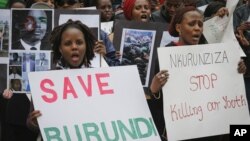A report says the youth wing of Burundi’s ruling party has been gang-raping women with connections to the opposition. Human Rights Watch says the rapes began after Burundi’s political crisis erupted last year.
Men armed with guns, knives, and sticks terrorize women at night in small towns and villages in the countryside of Burundi, according to Human Rights Watch.
Investigators found the men targeted women who they believed were married or related to anti-government supporters.
Skye Wheeler, a women’s rights researcher at Human Rights Watch, says they spoke to 70 women in the Nduta refugee camp in Tanzania.
“We spoke to many women, again and again we’ve heard stories of how members of the Imoberakure sometimes they knew them by face [and] will come to their houses at night, rape them often in front of the children and almost in every case gang-raped… and often ask for the husband or beat the husband or perhaps take the husband away ," said Wheeler.
The Nduta refugee camp is one of three camps in Tanzania that host tens of thousands of Burundians who fled the country.
According to the United Nations refugee agency, more than 170 people have reported rapes in Burundi or during their flight to humanitarian officials in the two newest Tanzanian camps, Nduta and Mtendeli.
Wheeler says in some cases police officers and men dressed in uniform were involved in the violence against women.
“We did find in some cases men dressed in police uniforms were part of the attackers but it's not always clear in Burundi whether this means they are actually police," said Wheeler. "However, there were other cases where women were raped in police stations or by police along the border when trying to leave the country.”
VOA attempted to contact a spokesman for Burundi’s ruling party and the police, but phone calls went unanswered.
Local human rights activists have also accused the Imbonerakure, the ruling party's youth league, of working with the police to commit rights violations. Burundi’s government has denied the accusations.
Local organizations have also accused the opposition of attacking government supporters and security forces. This month unknown gunmen killed a former government minister, Hafsa Mossi, in central Bujumbura.
The political crisis in Burundi began when President Pierre Nkurunziza announced he would run for a third term, a move his critics was not allowed by the constitution and the Arusha accord that ended Burundi’s civil war.
Nkurunziza won that election, earning 69 percent of the vote. Talks aimed at resolving the crisis have hit a snag, and the violence goes on.




